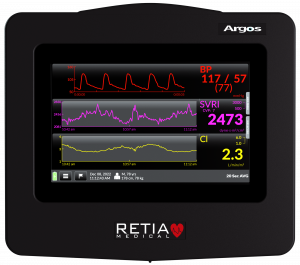WHITE PLAINS, NEW YORK, UNITED STATES, April 17, 2023/EINPresswire.com/ — Retia Medical, a leading medical technology company, is proud to announce that its innovative Multi-Beat Analysis (MBA) algorithm in the Argos Hemodynamic Monitor has been demonstrated to be accurate in patients with cardiogenic shock. The findings were published in the Journal of Cardiothoracic and Vascular Anesthesia in a recently conducted study.
The full article can be accessed via: https://www.sciencedirect.com/science/article/pii/S1053077023002367#fig0001
Cardiogenic shock is a severe condition where the heart is unable to pump enough blood to meet the body’s needs, often resulting from heart failure or other cardiovascular conditions. It is a critical condition that requires prompt and accurate assessment of cardiac function to guide appropriate management decisions. Furthermore, patients undergoing cardiac surgery or major non-cardiac surgery are at an elevated risk of developing cardiogenic shock and myocardial injury, making accurate assessments of cardiac index crucial in these high-risk patients.
Older pulse contour technologies have faced limitations in accuracy when it comes to cardiogenic shock, low flow, and arrhythmia. However, this study demonstrates that Retia Medical’s MBA algorithm can overcome these limitations and provide reliable and accurate assessments of cardiac index in these challenging conditions.
The study compared the cardiac index (CI) measurements from the MBA algorithm with the reference CI measurements obtained through intermittent (bolus) thermodilution via the pulmonary artery catheter. The author of the study, Dr. Bridgid Flynn Chief of Critical Care division at the University of Kansas Health System stated, “These findings demonstrate that the Multi-Beat analysis (MBA) available on the Argos monitor, may be of utility in trending changes in cardiac output in patients with cardiogenic shock. The minimally invasive Argos monitor makes it a desirable choice when attempting to avoid invasive hemodynamic monitoring. Additionally, the Argos cardiac output monitor could be very useful in patients for whom pulmonary artery catheterization is not feasible. “
Notably, the study also showed consistent accuracy of the MBA algorithm in patients with arrhythmia and low cardiac index (less than 2.2 L/min/m2), further validating its effectiveness in challenging clinical scenarios.
“We are thrilled with the results of this study, which demonstrate the accuracy of our MBA algorithm in patients with cardiogenic shock, low flow, and arrhythmia,” said Marc Zemel, CEO at Retia Medical. “This is a significant advancement in hemodynamic monitoring technology, and we believe it has the potential to greatly benefit clinicians in making critical management decisions for high-risk patients.”
Retia Medical’s Argos Hemodynamic Monitor with the MBA algorithm is a cutting-edge solution that provides real-time, accurate, and reliable hemodynamic monitoring in various clinical settings, including intensive care units, operating rooms, and burn units. With its ability to overcome the limitations of older technologies, the Argos Hemodynamic Monitor with the MBA algorithm offers clinicians a valuable tool in managing patients with cardiogenic shock and other challenging conditions.
For more information about Retia Medical and its innovative hemodynamic monitoring solutions, please visit www.retiamedical.com
About Retia Medical:
Retia Medical is a leading medical technology company that specializes in developing innovative solutions for hemodynamic monitoring. The company’s products are designed to provide real-time, accurate, and reliable monitoring of cardiac function in critical care settings. Retia Medical is committed to advancing the field of hemodynamic monitoring through cutting-edge technologies that improve patient care and outcomes.
Humberto Contreras
Retia Medical
+1 203-814-7987
[email protected]
Visit us on social media:
LinkedIn
![]()
Originally published at https://www.einpresswire.com/article/628422005/retia-medical-s-mba-algorithm-in-the-argos-hemodynamic-monitor-demonstrates-accuracy-in-patients-with-cardiogenic-shock




